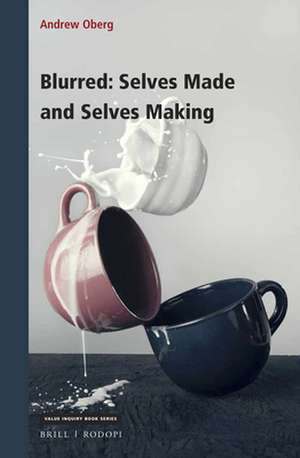Blurred: Selves Made and Selves Making: Value Inquiry Book Series / Cognitive Science, cartea 357
Autor Andrew Obergen Limba Engleză Hardback – 7 oct 2020
In this remarkably interdisciplinary study, philosophy of mind joins with contemporary neuroscience and cutting-edge psychology to lay bare the how of identity formation, judgment, and behavior generation. Drawing on thinkers from both the Continental and Analytic traditions, consciousness is explored and a uniquely realist self-concept presented that, if adopted, offers a life lived otherwise.
Preț: 714.25 lei
Preț vechi: 871.04 lei
-18% Nou
Puncte Express: 1071
Preț estimativ în valută:
136.69€ • 142.18$ • 112.84£
136.69€ • 142.18$ • 112.84£
Carte indisponibilă temporar
Doresc să fiu notificat când acest titlu va fi disponibil:
Se trimite...
Preluare comenzi: 021 569.72.76
Specificații
ISBN-13: 9789004440920
ISBN-10: 9004440925
Dimensiuni: 155 x 235 mm
Greutate: 0 kg
Editura: Brill
Colecția Brill
Seria Value Inquiry Book Series / Cognitive Science
ISBN-10: 9004440925
Dimensiuni: 155 x 235 mm
Greutate: 0 kg
Editura: Brill
Colecția Brill
Seria Value Inquiry Book Series / Cognitive Science
Cuprins
Acknowledgements
1 Background and Literature Review: four Representative Accounts
1.1 A Path Through the Thicket
1.2 Four Accounts of the Self
1.2.1 The Soft Anti-realist Position
1.2.2 The Hard Anti-realist Position
1.2.3 The Soft Realist Position
1.2.4 The Contextualized Soft Realist Position
1.3 Answers? – Guiding Questions
2 Laying the Groundwork: psychological and Embedded Factors, Proposing an Alternate Soft Realist Self Theory
2.1 Situating
2.2 Psychological Issues and the Self
2.2.1 Cognitive Structure
2.2.2 Going Back to Kristjánsson’s Sets
2.2.3 Going Back to Hume
2.2.4 Selves, Personal Identity, and Whole Persons
2.2.5 Intuitions and Emotions
2.3 Bodily and Embodied Issues
2.4 A Word on Consciousness and Category Mistakes
2.5 Certain Uncertainty, Randomness, and Limited Choice
2.6 Taking Less (but taking)
3 Phenomenological Approaches to the Self: objections, replies, and 0bjections
3.1 Review and Preview
3.2 A General Objection and Reply
3.3 Phenomenologically based Accounts and Related Issues
3.3.1 Phenomenology 1: strawson’s Thin Self/minimal Subject
3.3.2 Phenomenology 2: dainton’s Phenomenal Self
3.3.3 Phenomenology 3: going Back to Husserl
3.3.4 Phenomenology 4: heidegger on the Self
3.4 Concluding Introduction
4 Galen Strawson’s Panpsychism, Subjecthood, and the Self
4.1 A Starting Point
4.2 Panpsychism and Subjecthood
4.2.1 Strawson’s Total Physicalism
4.2.2 Responses to Strawson and Related Panpsychist Concerns
4.3 Seductive, but only a Shimmering
5 Consciousness, Qualia, and the Self
5.1 Modern Neuroscience and the Structure of Consciousness
5.1.1 Consciousness, Intent, Thinking: definitions
5.1.2 The Gap, the Hard Problem, the Neuronal to Experience Straits: navigating
5.1.3 An Aside: always Conscious?
5.2 Qualia and the Self
5.2.1 ‘What it is Like’
5.2.2 Artificial Intelligence and the Self: the Importance of Qualia
5.2.3 Software, Hardware, and Wondering about the Real
5.3 A Query at Arrival
6 Metaphysics and Time: the Reality of a realist self and its (re-)making
6.1 Metaphysics for a Realist Self
6.2 Time, the Made Self, and the Making Self
6.3 Exhausted Conclusion
Bibliography
Index
1 Background and Literature Review: four Representative Accounts
1.1 A Path Through the Thicket
1.2 Four Accounts of the Self
1.2.1 The Soft Anti-realist Position
1.2.2 The Hard Anti-realist Position
1.2.3 The Soft Realist Position
1.2.4 The Contextualized Soft Realist Position
1.3 Answers? – Guiding Questions
2 Laying the Groundwork: psychological and Embedded Factors, Proposing an Alternate Soft Realist Self Theory
2.1 Situating
2.2 Psychological Issues and the Self
2.2.1 Cognitive Structure
2.2.2 Going Back to Kristjánsson’s Sets
2.2.3 Going Back to Hume
2.2.4 Selves, Personal Identity, and Whole Persons
2.2.5 Intuitions and Emotions
2.3 Bodily and Embodied Issues
2.4 A Word on Consciousness and Category Mistakes
2.5 Certain Uncertainty, Randomness, and Limited Choice
2.6 Taking Less (but taking)
3 Phenomenological Approaches to the Self: objections, replies, and 0bjections
3.1 Review and Preview
3.2 A General Objection and Reply
3.3 Phenomenologically based Accounts and Related Issues
3.3.1 Phenomenology 1: strawson’s Thin Self/minimal Subject
3.3.2 Phenomenology 2: dainton’s Phenomenal Self
3.3.3 Phenomenology 3: going Back to Husserl
3.3.4 Phenomenology 4: heidegger on the Self
3.4 Concluding Introduction
4 Galen Strawson’s Panpsychism, Subjecthood, and the Self
4.1 A Starting Point
4.2 Panpsychism and Subjecthood
4.2.1 Strawson’s Total Physicalism
4.2.2 Responses to Strawson and Related Panpsychist Concerns
4.3 Seductive, but only a Shimmering
5 Consciousness, Qualia, and the Self
5.1 Modern Neuroscience and the Structure of Consciousness
5.1.1 Consciousness, Intent, Thinking: definitions
5.1.2 The Gap, the Hard Problem, the Neuronal to Experience Straits: navigating
5.1.3 An Aside: always Conscious?
5.2 Qualia and the Self
5.2.1 ‘What it is Like’
5.2.2 Artificial Intelligence and the Self: the Importance of Qualia
5.2.3 Software, Hardware, and Wondering about the Real
5.3 A Query at Arrival
6 Metaphysics and Time: the Reality of a realist self and its (re-)making
6.1 Metaphysics for a Realist Self
6.2 Time, the Made Self, and the Making Self
6.3 Exhausted Conclusion
Bibliography
Index
Notă biografică
Andrew Oberg, Ph.D. (2019), University of Wales-Trinity Saint David, is an associate professor at the University of Kochi, Japan. He has published widely in studies on the self and being, along with full-length fictional works: 'andrewoberg.blogspot.com'.










